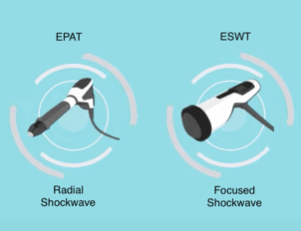Shockwave therapy is a non-invasive treatment option that uses high-energy sound waves to stimulate healing in the musculoskeletal system. It is commonly used to treat a variety of conditions, including:
- Tendinitis: Tendinitis refers to inflammation of a tendon, the thick fibrous cord that connects muscle to bone. Radial shockwave therapy can be effective in reducing pain and improving function in cases of tendinitis in the elbow (tennis elbow), shoulder, and other areas.
- Plantar fasciitis: Plantar fasciitis is a common cause of heel pain, characterized by inflammation of the plantar fascia, a thick band of tissue that runs across the bottom of the foot. Radial shockwave therapy has been shown to be effective in reducing pain and improving function in people with plantar fasciitis.
- Calcific tendinitis: Calcific tendinitis is a condition in which calcium deposits form within a tendon, leading to pain and limited range of motion. Radial shockwave therapy has been shown to be effective in reducing pain and improving function in people with calcific tendinitis of the shoulder.
- Myofascial pain syndrome: Myofascial pain syndrome is a chronic pain disorder that affects the fascia, the connective tissue surrounding muscles. Radial shockwave therapy may be effective in reducing pain and improving function in people with myofascial pain syndrome.
- Osteoarthritis: Osteoarthritis is a degenerative joint disease that causes pain, stiffness, and decreased range of motion. Radial shockwave therapy may be effective in reducing pain and improving function in people with osteoarthritis of the hip, knee, and other joints.
Overall, shockwave therapy is a safe and effective treatment option for a variety of musculoskeletal conditions. It is typically well-tolerated, with few side effects reported. However, as with any medical treatment, it is important to consult with a healthcare professional to determine if radial shockwave therapy is appropriate for your specific condition.

Shockwave comes in two types: Radial Shockwave (EPAT) and Focused Shockwave (ESWT)

Pingback: What’s the difference between shockwave and software therapy? – City Integrative Rehab